#wolfram von eschenbach
Text
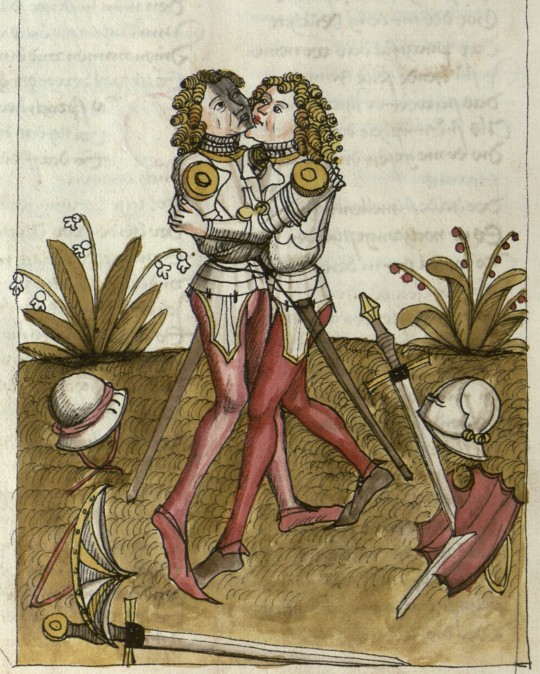
parzival & feirefiz
illustration for a copy of wolfram von eschenbach's arthurian poem "parzival", lake constance region, c. 1467
source: Bern, Burgerbibliothek, Cod. AA 91, fol. 158v
"Because his father was white and his mother black, Feirefiz's skin consists of black and white patches. His appearance is compared to that of a magpie or a parchment with writing on it, though he is considered very handsome." (wikipedia)
#15th century#wolfram von eschenbach#parzival#percival#feirefiz#medieval art#medieval studies#medieval crt
345 notes
·
View notes
Note
Do you have a guide/a recommended reading list for getting into Arthurian legends? I’ve been really getting into it in the past few months but I feel like I’m missing out on a lot of the foundations of it. (If you don’t and this is too big of an ask totally feel free to ignore this lol)
hello, anon.
i don't currently although i have plans to add another page to my blog listing medieval texts as well as links to download pdfs of them. i have english translations of texts originating in belarussian, dutch, french, german, hebrew, italian, latin, middle english, and last but not least, welsh.
in the mean time, i've collected for you some key texts that are readily available to read for free online!
le morte d'arthur by sir thomas malory [part 1] [part 2]
the history of the britons by nennius [here]
the mabinogion translated by lady charlotte guest [here]
four romances by chrétien de troyes [here]
parzival by wolfram von eschenbach [part 1] [part 2]
the wedding of sir gawain and dame ragnelle translated by thomas hahn [here]
sir gawain and the green knight translated by j. r. r. tolkien [here]
better translations/formatting forthcoming! enjoy. :^)
#arthurian legend#arthurian legends#arthuriana#le morte d'arthur#sir thomas malory#the history of the britons#nennius#the mabinogion#lady charlotte guest#chrétien de troyes#chretien de troyes#parzival#wolfram von eschenbach#the wedding of sir gawain and dame ragnelle#sir gawain and the green knight#ask#answered#book reccs#book reccomendation#sources#my post
194 notes
·
View notes
Text
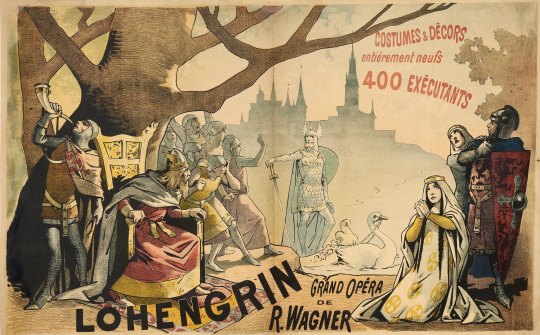
Poster for the Richard Wagner opera Lohengrin, The Swan Knight
by Alfred Choubrac
#alfred choubrac#art#lohengrin#knight#richard wagner#opera#german#germany#romantic#medieval#middle ages#knights#arthurian#chivalry#chivalric romance#swan#swans#parzival#wolfram von eschenbach#garin le loherain#swan knight#knight of the swan#boat#damsel in distress#damsel#germanic mythology#king#mediaeval#romanticism#folklore
38 notes
·
View notes
Text
started reading Parzival by Wolfram von Eschenbach (early 13th century) and I find it very funny how in (german) medieval literature (including the norse hero sagas in the eddas, and the volsungs saga) the heros are always "yes he was so beautiful and perfect and everyone loved him and he was so strong and never failed at anything, and people threw their money at him because he was so great"
when today we call that a gary stue, and dismiss heros like that
are there any medievalists that can talk about this? is there a reason behind the perfect hero? or was that just the trend?
#personal#medievalist#medieval literature#medieval poetry#parzival#middle high german#middle high german literature#wolfram von eschenbach
45 notes
·
View notes
Text
youtube
#ludwig ii#richard wagner#parsifal#opera#wonderful#german music#german opera#king ludwig ii#wolfram von eschenbach#chretien de troyes#Youtube
3 notes
·
View notes
Text

[...]

The two funniest thing from Parzival:
Wolfram thought he was being clever when flipped the names around: "Terre-de-la-schoye"? From Mount "Fay-Morgan"? It's like calling the ruler of Britain "King Camelot of Arthur"
The sheer hilarity of Morgan le Fay being Arthur's great-grandmother instead of a sister
#parzival#mazadan#terdelaschoye#morgan le fay#king arthur#arthuriana#arthurian legend#arthurian mythology#arthurian legends#german arthuriana#wolfram von eschenbach
3 notes
·
View notes
Photo

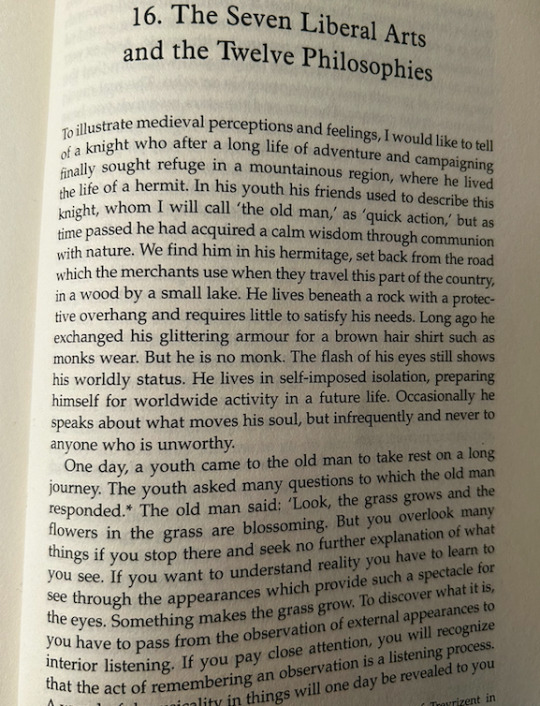

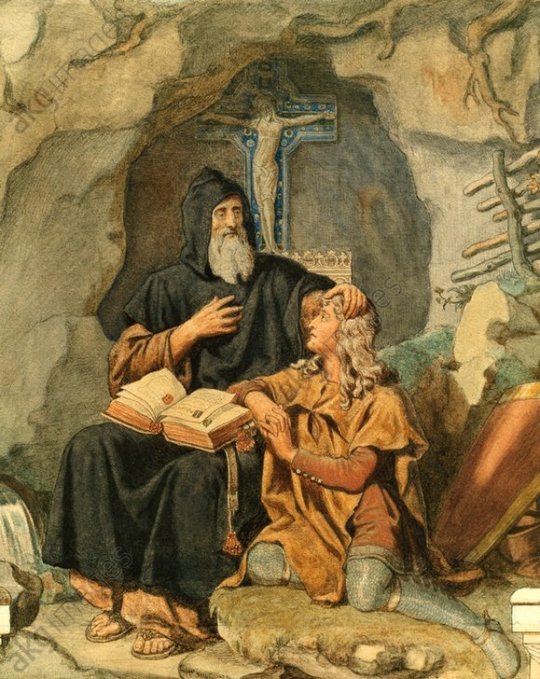
Maecenas Presenting the Liberal Arts to Emperor Augustus by Giovanni Battista Tiepolo + The Death of Merlin by Walter J. Stein + Restored in large parts of the trophies of Octavian Augustus by Giovanni Battista Piranesi + Trevrizent in Wolfram von Eschenbach’s 'Parzival,' or Schionatulander in Albrecht von Schafenberg’s 'Jüngerer Titurel' (noted in Stein)
#Maecenas#Augustus#Caesar Augustus#Giovanni Battista Tiepolo#Walter Johannes Stein#Octavian#Giovanni Battista Piranesi#spiritual science#anthroposophy#Wolfram von Eschenbach#Parzival#Schionatulander#Albrecht von Schafenberg#Jüngerer Titurel#Titurel
2 notes
·
View notes
Text
I'm currently just over half-way through reading Chretien de Troyes' Perceval, the Story of the Grail and was last night was intrigued by the description of the (here unnamed) monstrous woman that comes to Arthur's court and condemns Perceval for failing to ask the Fisher King about the Bleeding Lance and the Grail, so following the description, I tried drawing her:
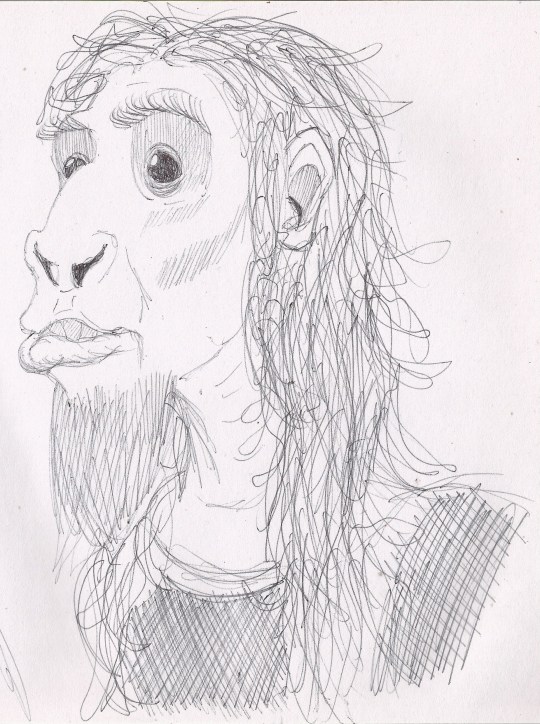
This morning, though I'm not yet at Wolfram von Eschenbach's Parzival in my reading, I wanted to try and draw Wolfram's version of the monstrous woman (the drawing on the left), here called Kundrie the Sorceress, who is more beastly than Chretien's version. I then also decided to draw Ragnelle (the drawing on the right):

Finally for fairness's sake, I drew Ragnelle's non-loathly form. I gave her a snotty nose (though not as severe as in her loathly form) because I loved the idea that it's simply something she can't help, magic curse or no (I say as someone who is frequently subject to colds and a snotty nose in general):

2 notes
·
View notes
Text
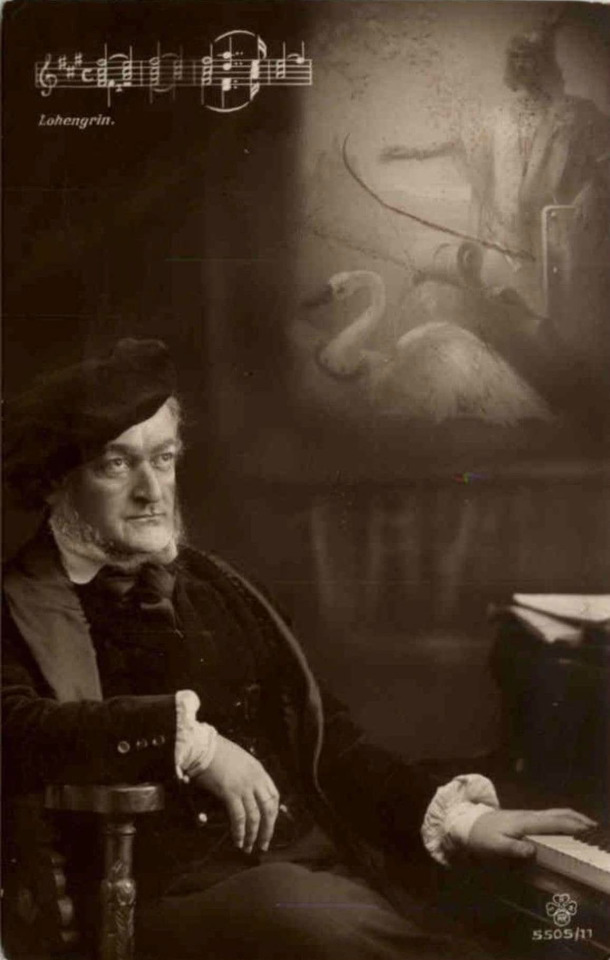
August 28.1850 the first Performance of Richard Wagner
„Lohengrin“ was in Weimar. What a great work!
Here we see a rare postcard.
3 notes
·
View notes
Text

0 notes
Text
ist es möglich ? eine neue walthram fanfiction ? das gleicht einem weihnachtswunder !
#mit den nerven am ende weil ich eine halbe stunde versucht hab es zu posten#und ao3 immer kurz davor einen error hatte#walther von der vogelweide#wolfram von eschenbach#walthram
1 note
·
View note
Text
Parzival - A fool becomes the Grail’s King III/III

Wolfram von Eschenbach ‘Parzival and Titurel’ published and explained by Dr. Simrock in 1861, two volumes.
“When Lucifer sank into hell, man began. God formed Adam, the son of his hands, from the clay of the earth. From Adam's flesh he broke Even, from whom the adversity comes, who ignored the Creator and destroyed our salvation. From both came a second fruit: one's selfishness advised him to take his ancestor's virginity in blind passion. Here some people begin to ask, is this fairy tale presented to them, how could this be possible? It was only possible through sin." Parsifal replied: "Lord, I doubt whether that happened. Who gave birth to his father, whose ancestor lost her virginity, as you believe? You shouldn’t have mentioned it.”
The innkeeper immediately replied: “I will take you out of this doubt. If I don't tell the truth, then deceit leads to complaint. The earth was Adam's mother: God formed him from earth; Yet the earth remained a maid. Now I haven't told you yet who took over her maid duties. Cain was fathered by Adam, who beat Abeln for nothing. When blood fell upon the pure earth, her servitude was fled: the son of Adam did this to her. Then human anger and envy arose; They continue from that time. There is nothing purer on earth than the virgin's cunning. Now see how pure the maidens are: God himself was the child of the virgin woman. Two people came from maidens: God himself took the form of the fruit of the first maiden: so he showed great mercy. Misfortune and joy came to us from Adam's seed. He wants to belong to us, his praises ring out from choirs of angels; But we must flourish from clan and sin so that we never escape sin. Mercy works and creates, who suffered injustice in the human image and faithfully fought against unfaithfulness.
You should forget anger: you presumptuously forfeit salvation. You should repent of your sins and leave behind bold speech. Whoever wants to avenge his suffering with untamed speech, let your reward be known to you; his own mouth will judge him. Take to the new old tale that it may teach you faithfulness. That orator Plato already spoke in his time and Sibyl, the seer, with unerring sense predicted many a year that a great pledge would come to us for our guilt. God's hand and divine love took us from hell; She left the wicked inside. Good tidings came to us from the true Minner's mouth. He is a shining light and does not waver in his love. Whoever he is supposed to show love to will be happy with his love. The message announces two things: God's hatred and God's love are to be bought from all the world: which do you choose to win? The unrepentant sinner flees from divine faithfulness; But whoever atones for his guilt deserves the mercy of the Most High.
No barrier stands in the way of the highest. Thought resists the gaze of the sun: thought is hidden without a lock, hidden from all creatures, thought is dark without appearance; But God’s clarity shines through. She shines through the dark wall, she comes running secretly in a leap that doesn't roar, that doesn't sound when it penetrates the heart.
No matter how quick the thought may be, before it reaches the threshold of the heart, it is fully understood:
God chooses those he finds worthy. Since God himself spies through thoughts, woe to him who commits sinful deed! Whoever forfeits his greeting with works, so that God must be ashamed, what good is worldly discipline? Where is his soul's refuge? If you oppose God, who is ready for both love and anger, then you are the lost one. Now turn your mind to kindness, that he may thank you.”
[The hermit Trevrezent to Parzival]
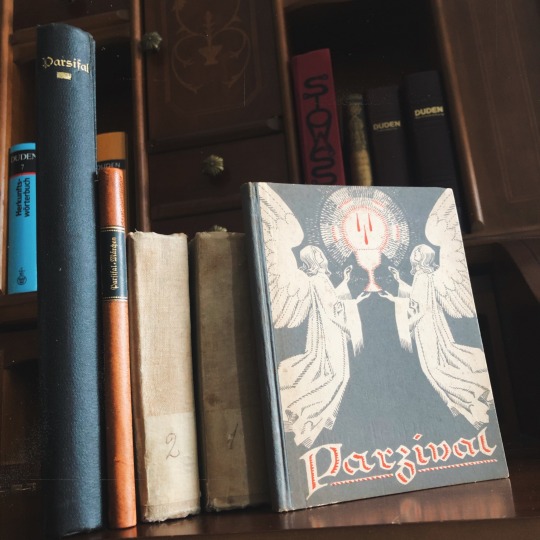
Eschenbach says that he found the legend of Parzival in an Arabic work. At Toledo a certain Kiot is said to have found a manuscript in Arabic which could be attributed to Flegantis.
Flegantis, a pagan on his father's side and a Jew of Solomon's family on his mother's side, read the name of the Grail in the stars and that a group had left it on earth and handed it over to the care of the "baptized fruit". However, the actual nature of the Grail is not written down, just as only the Aventure of the Grail, not that of Parzival and also not of the guardians of the Grail: Titurel, Sigunen and Schionatulander, since Kiot would have looked for it in Latin books; Eschenbach probably appealed to Kiot to justify his version and to explain his deviation from Chrestien's famous predecessor (originality of invention was not one of the demands that that time placed on its poets)...
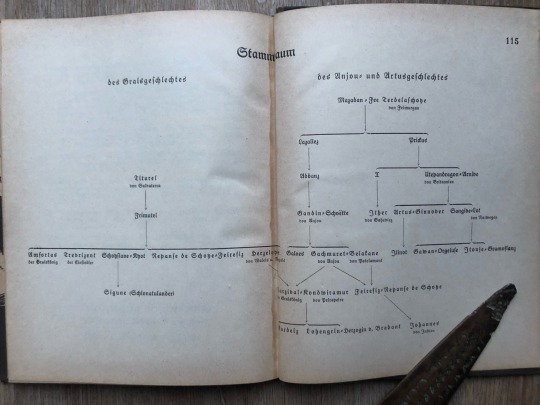
Further origins of the Grail myth
Ferdinand Wolf: “The Grail myth was probably developed from Celtic-Druid elements in southern France by the followers of templeism, and the transfer of the Montsalvage to Spain was obvious enough and is probably just as important as Kiot's discovery to Toledo, the seat of black art , just a mystification, as, as is well known, Spain, the Orient, Greece and Hungary are the homelands of the wonderful and mystical in the geography of legends or only have the meaning of distant, unknown strangers."
In the Middle Ages, the Jewish tradition of the legend was adopted; Flegantis is the same as Zabulon in the Wartburg War; Eschenbach puts it in the mouth of the hermit Trevrezent: “Those angels who watched Lucifer's fight against the Trinity doing nothing would have to take care of the Grail,” but he retracts this and explains that he only stated it in order to derive Parzival from the Grail;
See also:
Wartburg Wars: “Sixty thousand angels who wanted to drive God out of heaven cast a crown for Lucifer. When the Archangel Michael broke this from Lucifer's head, a stone jumped out of it, and this stone is the Grail."
See also: The Heliotrapezon - The sun table of the Ethiopians, which was already covered with meat and fish every night in the time of Herodotus - The ancient Egyptian Hermes Cup - That of Jamshid, Hercules and Bacchus of the Mysteries - The black stone in the Kaaba in Mecca, the one the gems of paradise, which are said to have fallen to earth at the same time as Adam - The Philosopher's Stone - German fairy tale “Little Table Set Yourself”

More than 20 pages of notes in German.. but due to limitation of letters, I will share a selection of my favourite chapter with the future father of Prester John, the (half-)brother of Parzival and the son of the Queen Belakane and Gahmuret.
XV. Feirefis
P begegnet einem heidnischen Ritter, der mit fünfundzwanzig Heerscharen von verschiedenen Sprachen über das Meer gekommen war und in der Nähe geankert hatte
„Parzival ritt balde vor einem großen Walde auf wüst gelichteten Wegen einem reichen Gast entgegen. Ein Wunder, wenn ich armer Mann den Reichtum euch vermelden kann, der der Heid an seiner Rüstung trug. Sag ich davon mehr als genug, doch muss ich mehr davon erzählen, will ich das Meiste nicht verhehlen.“
Reichtum wird verbildlicht mit Vergleichen etwa „Wie großen Zins Artusens Hand Bretagne zollt und Engelland, damit bezahlt‘ er nicht die Steine.“ Rubinen, Chalcedonen;
Helmschmuck bildet ein Ecidemon ab und generell „schmuck zu schauen“
Eschenbach beschreibt den Kampf mit Sorge und viel toleranter Empathie, die innere Verbundenheit der beiden Brüder hervorhebend [Auszüge ab V738 ff]:
- „Sie hatten Herz und Blut gemein; Sie sind sich kund, wie fremd sie sei’n! Nun kann ich diesen Heiden von dem Getauften nicht mehr scheiden.“
- „Man sah den Kampf so geraten, ich kann mirs nicht versagen, schmerzlich muss ich’s beklagen, dass ein Fleisch und ein Blut sich so viel zu Leide tut, die man als Geschwister kennt, lautrer Treue Fundament.“ [V70]
- „(…) Wenn man als Zwei sie will betrachten, die doch für Eins nur sind zu achten. Ich und mein Bruder sind ein Leib wie guter Mann und gutes Weib.“
- „Die Arme schwangen sich mit Kunst, aus den Helmen lohte Brunst, von ihren Schwertern fuhr der Wind. Gott schütze Gahmuretens Kind! Der Wunsch gilt ihnen beiden, dem Getauften und dem Heiden: Denn ich rechne sie für Einen, sie würdens selber meinen, wären sie sich recht bekannt: Sie setzten nicht so viel zu Pfand, denn nicht minder gilt ihr Streit als Ehre, Freude, Seligkeit. Wer auch hier den Preis gewinnt, doch hat er, wenn er Treue minnt, die Freude dieser Welt verloren und dauernd Herzeleid erkoren.“
Beschreibung Schild des F aus Aspinde „Asbest, das weder fault noch brennt (…) Chrysoprass und Türkis, Smaragds und Rubin, und noch von anderen Farben schien.“ Der Buckel sei Anthrax, hier wohl als Karfunkel bekannt
P und F kämpfen, bis Ps Schwert zerspringt, weshalb F, beeindruckt von P und aus Ehrgefühl, von seinem Pferd absteigt und P nach seiner Herkunft fragt; P verweigert Auskunft zu geben, weshalb F, auch weil er sich als Besiegter sah, seinen vollen Namen nennt, Anschewein hörend wird P wütend
Wie sich dann beide Brüder erkennen:
„Der reiche Feirefis begann: „Held, bei deiner Zucht, sag an, da dir ein Bruder leben soll, wie sieht der aus? Du weißt es wohl. Beschreibe mir sein Angesicht; Seine Farbe hehlte man dir nicht.“
Da sprach den Herzeleid gebar: „Wie beschrieben Pergament fürwahr, Schwarz und weiß dort und hier; Ekuba beschrieb es mir.“
„Der bin ich“, versetzte der Heide, nicht lange säumten sie da beide, Feirefis und Parzival, von Helm und Härsenier zumal entblößten sie sich gleich zur Stund, Parzival fand lieben Fund, den liebsten, den er jemals fand. Den Heiden hatt er bald erkannt: Sein Antlitz zeigte Elsternfarben. Hass und Groll im Kuss erstarben dem Getauften und dem Heiden. Freundschaft ziemt‘ auch besser Beiden denn ihnen stünde Hass und Neid. Treu und Liebe schied den Streit.“ [S. 327]
F preist Juno, Jupiter und seinen gefunden Bruder P, P entgegnet, dass er gern besser sprechen würde, doch er leider nicht so weise wäre: „Doch bin ich leider nicht so weis, dass ich Eurer Würde preis mit Worten noch erhöhen könnte: Gott weiß, wie gern ichs euch vergönnte! Was Herz und Auge nur vermag, sie sprechen Euerm Preise nach (…)“
F will nicht länger von P gesiezt werden:
„ ,,Nicht länger ihrzen sollt Ihr mich: Hatten wir doch einen Vater.“ Mit brüderlicher Treue bat er, dass er Ihrzens ihn erließe, von nun an Du ihn hieße. Die Rede war dem Waleis leid: Bruder, Eure Herrlichkeit vergliche der des Baruchs sich; Älter seid ihr auch als ich. Meine Jugend, meine Armut sei solcher Untugend frei, dass ich Du zu Euch spräche, und mich so der Zucht entbräche.“
#I should do more for university#Parzival#Wolfram von Eschenbach#Priester Johannes#medieval poetry#Minnedienst
0 notes
Text

Parsifal (Parzival) by Martin Wiegand
#parsifal#parzival#art#martin wiegand#pursuit#percival#arthurian#knight#quest#holy quest#graal#holy grail#grail#chivalry#chivalric romance#richard wagner#wolfram von eschenbach#europe#european#medieval#history#knights#castle#castles#grail castle#knight errant#munsalväsche#monsalvat#montségur#gralsburg
158 notes
·
View notes
Text
Parzival is such a himbo
#personal#parzival#wolfram von eschenbach#medieval literature#medieval poetry#mittelhochdeutsch#medieval german literature
9 notes
·
View notes
Photo

“His ways were a refuge from falsity.” - Wolfram von Eschenbach, Parzival
I asked for a sign and you have given me a sign.
I am Yours. My soul. My body. My being.
#Wolfram von Eschenbach#Parzival#Excalibur#Parsifal#Medieval#Poem#Knight#Round Table#Christianity#religion#prayer
1 note
·
View note
Text
Breaking news, Myth AU Railey does NOT qualify as Hohe Minne!!! Not because of the fucking, but because Tahir is NOT taking the deep romantic and exclusive bond seriously!!! My man, you can't just ask that big hunky blonde to plow you to relieve stress, you gotta want his heart!!! Unbelieveable.
#storie nostre#railey#beablabbers#anyways yaaaaay the wolfram von eschenbach poem with sine klawen is back#idk the title rn but i looooved that one in the medieval music seminar
3 notes
·
View notes